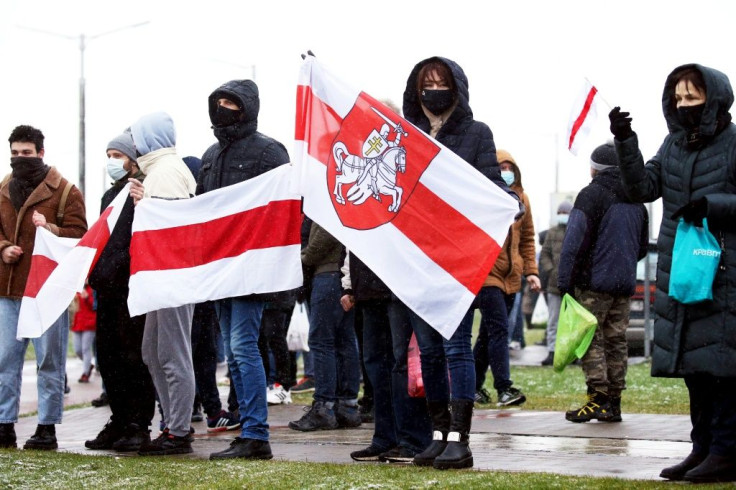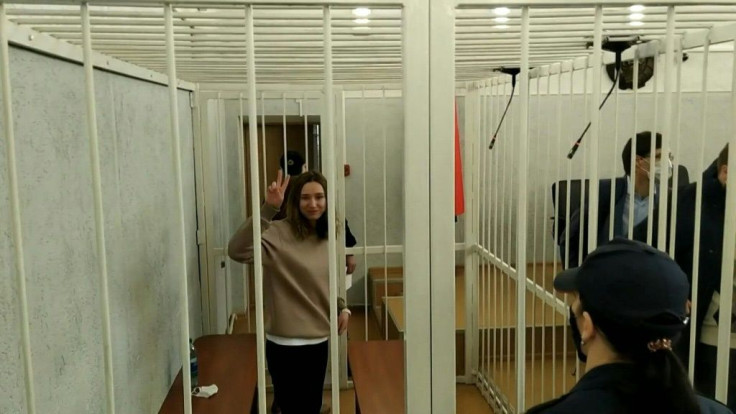Belarus Reporter, Doctor On Trial After Protester's Death
A journalist and a doctor went on trial in Belarus Friday, accused of disclosing the medical records of a protester who died after being detained by police during unprecedented anti-government protests.
The hearing opened one day after another court sentenced two journalists to two years in prison for filming a protest last year, the first lengthy prison term in a crackdown on independent media.
The cases have triggered concern in the EU, which called the intimidation of journalists and others "unacceptable" and called for it to stop.
Last year, 31-year-old former soldier Roman Bondarenko died from head injuries after police arrested him at a protest in the capital Minsk amid a crackdown on the opposition following the disputed re-election of strongman Alexander Lukashenko.
Investigators said Bondarenko showed signs of intoxication, but independent media cited a doctor as saying no alcohol had been found in his body.
Katerina Borisevich, a journalist for the independent Tut.by news website that published the story and doctor Artyom Sorokin were in court Friday for releasing the protester's medical information.
They are accused of "disclosing medical records, with grave consequences" and face up to three years in prison.

Borisevich smiled at cameras from inside a cage for defendants and made a heart symbol with her hands, a gesture common among the opposition.
Dozens of supporters gathered outside the court building and in its corridors, chanting her nickname "Katya".
According to the prosecution, Borisevich, 36, convinced Sorokin, 37, to disclose information about Bondarenko and share copies of his medical documents with journalists.
Bondarenko's mother Yelena told journalists at the start of the trial that Borisevich and Sorokin "didn't break any laws" and that they had her permission to share his information.
"I am hoping for a fair trial," she was quoted by Tut.by as saying.

No independent media outlets were accredited to cover the trial, which is being held behind closed doors because the case materials include medical documents.
Representatives from the US, German, French embassies and of the EU delegation in Minsk were present at the court, Tut.by reported.
The Prosecutor General's Office announced this week it had opened a criminal case into Bondarenko's death, but said it had no evidence of police involvement.
Investigators announced Friday they will not launch a criminal probe into the death of another protester Alexander Taraikovsky, who died during the first days of the rallies in August.
Police initially said that an explosive device Taraikovsky had intended to throw at law enforcement during an August 10 demonstration detonated in his hands, but witness accounts suggested he was shot by police.
Investigators Friday said Taraikovsky was drunk and had "provoked" riot police to shoot at him, but added that the shots were not meant to be lethal.
Huge protests erupted in Belarus in August after Lukashenko claimed a landslide election win over opposition figure Svetlana Tikhanovskaya.
Authorities responded with a fierce crackdown, with police using rubber bullets, tear gas and water cannon against demonstrators. Several people including Bondarenko died in the crackdown.
The European Union condemned Bondarenko's death and the crackdown on protesters, imposing sanctions on Lukashenko and his allies. Fresh EU sanctions targeting Belarusian businessmen were introduced Thursday.
The spokesman for EU foreign policy chief Josep Borrell also lashed out Friday at the cases against the journalists as well as raids targeting activists, human rights campaigners and trade unions.
"These actions are unacceptable. They have to stop," spokesman Peter Stano told a press conference.
He said the crackdown "is really just another action, another expression of Belarusian authorities to try to attempt to limit the free flow of information".
The actions by the Belarus government are on the agenda of an EU foreign ministers' meeting on Monday.
© Copyright AFP 2024. All rights reserved.





















